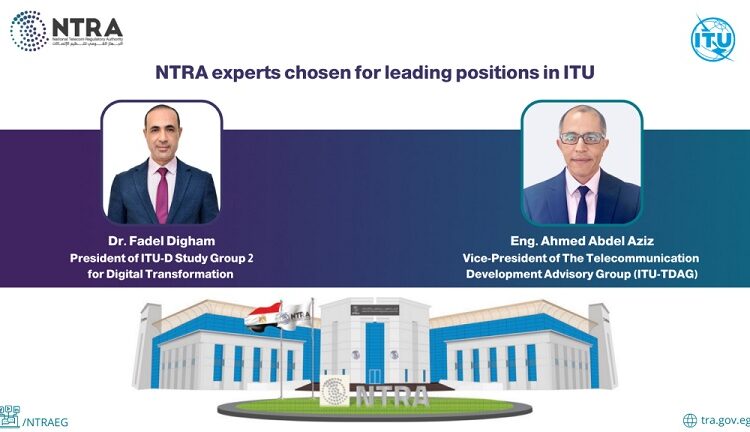Within the proceedings of the World Telecommunication Development Conference, subordinate to the International Telecommunication Union (ITU-WTDC 22), held in Kigali-Rwanda from June 6-16, 2022, Dr. Fadel Digham, Head of Technical Office Sector in the National Telecommunications Regulatory Authority of Egypt (NTRA) was chosen as President of ITU-D Study Group 2 for Digital Transformation. Eng. Ahmed Abdel Aziz, Head of National Projects Sector in NTRA, was also chosen as Vice-President of The Telecommunication Development Advisory Group (ITU-TDAG).
Headquartered in Geneva, Switzerland, the International Telecommunication Union (ITU) is the United Nations specialized agency for information and communication technologies (ICTs). ITU’s global membership includes 193 Member States in addition to more than 900 members and partners from different sectors. The agency’s main role is actually focused on establishing regulatory policies and frameworks for telecom services across the globe, as well as shaping the global environment to achieve growth and sustainable development with respect to ICT. It actually consists of three major sectors; Radiocommunication Sector (ITU-R), Telecommunication Standardization Sector (ITU-T) and Telecommunication Development Sector (ITU-D).
It is worth nothing that Eng. Wael El-Sayed, Senior Expert at NTRA, had been previously chosen as President of ITU-R Study Group 1 on spectrum management, whereas Mr. Ahmed Said, Senior Expert at NTRA, had been also chosen as President of ITU-T Study Group 3 on economic issues. Therefore, Egypt has become the first state across the world to simultaneously preside the ITU Study Groups within each sector of the agency’s three major sectors.
Among several representatives of states within Arab, European and Asian groups at ITU, the Egyptian administration was chosen as the head of ITU-D Study Group 2: Digital Transformation, for its unique part in this field. In fact, Egypt has made effective contributions to international events and different topics, and has assumed a pivotal role in the Arab and African regions.
ITu-D Study Group 2 is actually deemed of a huge importance due to the specialized reports it generates, which are also considered a reference for the countries across the world to implement digital transformation and the create a fully-fledged digital society. Furthermore, Study Group 2 is mainly concerned with digital transformation in countries; developing states in particular, when it comes to creating smart cities and societies, establishing regulations, adopting technical solutions for digital services as well as apps, and introducing cybersecurity policies. It also discusses topics of digital service adoption by users, employment of ICT techniques to protect environment as well as encounter climate shifts, recycling of telecom devices, approval as well as protection of electronic devices. ITU-D Study Group 2 also tackles policies of electromagnetic wave-exposure.
In fact, choosing Egypt to preside ITU-D Study Group 2: Digital Transformation, comes in line with Egypt’s ICT role reinforced at the international as well as regional levels. This also outlines the state’s contributions to create and provide attractive as well as competitive environment in Egypt’s telecom market and adds to the chain of international achievements made in telecom regulation. Some of these achievements include choosing Egypt as president of two Study Groups at ITU-R and ITU-T, choosing MY NTRA among 5 top E-Government projects worldwide within ITU-WSIS 2022, moving up 54 positions to occupy the 41st ranking on the ITU-ICT Regulatory Tracker, and moving up 43 positions to be ranked number 36 on GSMA’s Mobile Wallet Regulatory Index.






Discussion about this post